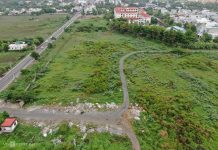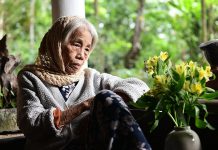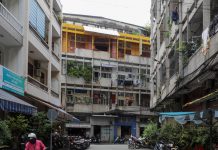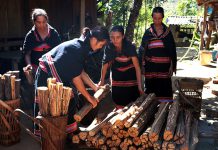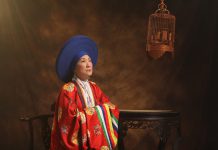A series of photographs by Nguyen Ngoc Thai set against a communal house capture the daily life and moods of the Ba Na people.

Two Ba Na ethnic women pound rice and sift corn in front of the Kon K’ri Communal House that stands by the Dak Bla River in Dak Ro Wa Commune, Kon Tum Town, Kon Tum Province.
The communal houses (rong in Vietnamese) on stilts with their distinct high, tapering roof are built using natural materials like wood, bamboo and leaves. The communal house is the “heart” of a village.
Two women pound grains outside the Kon K’ri Communal House.
Nguyen Ngoc Thai, known as Thai Bana, is a photographer who lives in Kon Tum Province. He has spent many years capturing portraits of locals and the beauty of traditional activities around the communal houses in Kon Tum.
 |
A village elder weaves a bamboo basket, smiling as a playful kitten sits inside it. Many villagers make a living by weaving baskets of different kinds.
A Ba Na woman interacts with her baby while weaving fabric inside the Kon K’ri Communal House.
In the Central Highlands region, men typically are craftsmen and musicians, playing different musical instruments, while women weave brocade and dance to the music.
Brocade products, ranging from fabric lengths, scarves, shirts and dresses as well as bags and other items are not only made for their own daily use, but also for sale to tourists.
A village elder teaches children how to play the gong.
The gong, a musical instrument native to the Central Highlands, is popular in the five provinces of Kon Tum, Gia Lai, Dak Lak, Dak Nong and Lam Dong.
The UNESCO recognized the space of gong culture in Vietnam’s Central Highlands as a Masterpiece of the Intangible Heritage of Humanity in 2005.
[A video by Phan Nguyen of Ba Na people in Gia Lai Province playing gongs to mark a new harvest season]
 |
A boy lies on the upraised floor of a house and plays with a pet dog resting below near a woman pounding grains.

Art and religion are part of their daily life. An elder carves wooden culptures at the Kon Klor Village.
“Often displayed in the communal house, these statues have a special meaning for ethnic minority people like the Ba Na and Gia Rai since it is a form of tribute to and communication with dead family members,” Thai said.
 |
A boy plays with a carved-wooden sculpture. The author named this photo “Eye of the Ba Na.”
Villagers play gong and perform their traditional dance, mua xoang, around a bonfire in front of the Kon K’ri Communal House.
“Men and women, elders and children, everyone holds hands and dances to the rhythm of the gongs, and the atmosphere is jubilant,” said Thai.
Three children sit around a small fire in front of the Kon Gu Communal House in Ngok Wang Commune, Dak Ha District, Kon Tum Province under a starry sky.
During the dry season, authorities pay special attention to communal houses made of easily inflammable materials.



